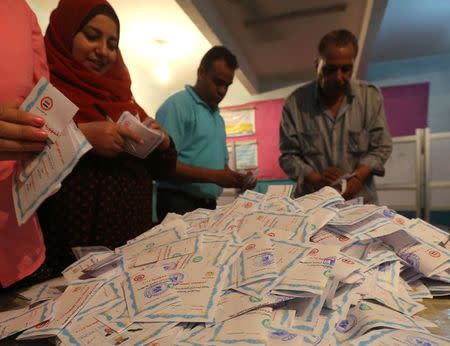Egypt's Sisi heads for big win in early provisional count

By Yasmine Saleh and Michael Georgy CAIRO (Reuters) - Abdel Fattah al-Sisi, the former army chief who toppled Egypt's first freely elected leader, was on course for a sweeping victory in the country's presidential election on Wednesday, early provisional results showed. But a lower than expected turnout figure raised questions about Sisi's credibility after his supporters had idolised him as a hero who can deliver political and economic stability. Sisi captured 91.8 percent of votes cast in 50 percent of polling stations, judicial sources said. His only rival, leftist politician Hamdeen Sabahi, gained 3.4 percent while 4.8 percent of votes were declared void. Fireworks erupted in Cairo when Sisi's results began to emerge. His supporters waved Egyptian flags and sounded car horns on the crowded streets of the capital. About 1,000 people gathered in Tahrir Square, the symbolic heart of the popular uprising that toppled Hosni Mubarak in 2011 and raised hopes of a democracy free of influence from the military. Sisi supporters honked their car horns and waved flags. "We are joyful because Sisi got so many votes, the results will come after an hour, we are here to celebrate," said Kawther Mohamed, who went to Tahrir with her daughters. But the former military intelligence chief may not have the popular mandate needed to restore healthy growth to the economy, ease poverty and unemployment, and end costly energy subsidies in the most populous Arab nation. Turnout was 44.4 percent of Egypt's 54 million voters, according to the judicial sources. That would be less than the 40 million votes, or 80 percent of the electorate, that Sisi had called for last week. It would also suggest that he had failed to rally the overwhelming support he hoped for after toppling President Mohamed Mursi of the Muslim Brotherhood, following street protests against his rule last year. A tour of Cairo polling stations on Wednesday saw only a trickle of voters. The same pattern emerged in Egypt's second city, Alexandria, Reuters reporters said. In a country polarised since the revolt against Mubarak, many Egyptians said voters had stayed at home due to political apathy, opposition to another military man becoming president, discontent at suppression of freedoms among liberal youth, and calls for a boycott by Islamists. VOTE EXTENDED The two-day vote was originally due to conclude on Tuesday but was extended until Wednesday evening to allow the "greatest number possible" to vote, state media reported. Hossam Moanes, Sabahi's campaign manager, questioned the legitimacy of the vote, saying there had been violations. "Until yesterday turnout was much lower than what was announced today. Did the percentage suddenly reach 46 percent?" Some Egyptians, exhausted after three years of upheaval, have concluded that Sisi is the man who can bring calm, even though past leaders from the military mismanaged the country. Earlier, a 45-year-old shopkeeper, who gave her name as Samaa, said at a polling station in downtown Cairo she was supporting Sisi. "Our country can now only be handled by a military man, we need order." Critics and human rights groups say abuses have spread since Sisi's ouster of Mursi and fear he will rule the country with an iron fist. Despite an official campaign to bring out more voters, Egyptians, many opposed to Sisi, gave various reasons for their lack of enthusiasm. The Muslim Brotherhood, believed to have one million members, has rejected the poll, describing it as an extension of the army takeover. The group, loyal to Mursi, was outlawed by the military as a terrorist group and saw around 1,000 members killed in a security crackdown. Young secular activists, including those who backed Mursi's ouster, had become disillusioned with Sisi after many were rounded up in the security crackdown that also restricted protests. Since he gave a series of television interviews, many Egyptians feel Sisi has not spelled out a clear vision of how he would tackle Egypt's challenges, making a general call for people to work hard and be patient. Some Brotherhood supporters felt emboldened to speak out, feeling vindicated by the lower turnout. "Now I can say I am a Mursi supporter," said Ahmed Ali, a 28-year-old Cairo shopkeeper. (Additional reporting by Maggie Fick, Stephen Kalin, Shadia Nasralla and Samia Nakhoul in Cairo and Abdelrahman Youssef in Alexandria; Writing by Michael Georgy; Editing by Giles Elgood)

